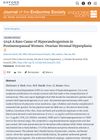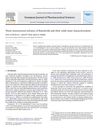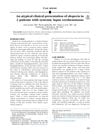 11 citations,
May 2021 in “Journal of Medical Virology”
11 citations,
May 2021 in “Journal of Medical Virology” Men are more likely to have severe respiratory viral infections like COVID-19 due to hormonal and genetic differences, while women generally have stronger immune responses.
 22 citations,
November 2007 in “Journal of Investigative Dermatology Symposium Proceedings”
22 citations,
November 2007 in “Journal of Investigative Dermatology Symposium Proceedings” Hair growth and health are influenced by stress and hormones.
 3 citations,
January 2011 in “Female pelvic medicine & reconstructive surgery”
3 citations,
January 2011 in “Female pelvic medicine & reconstructive surgery” Hormones significantly affect women's sexual function, and more research is needed to improve treatments for sexual dysfunction with minimal side effects.
 11 citations,
August 2013 in “International Journal of Cosmetic Science”
11 citations,
August 2013 in “International Journal of Cosmetic Science” The study suggests that a new protease inhibitor can make hair harder to pull out, potentially reducing hair loss.
 November 2019 in “Neuro-oncology”
November 2019 in “Neuro-oncology” Rind-based techniques can lower scalp radiation dose and reduce hair loss in brain cancer treatment.
 80 citations,
September 1984 in “Journal of The American Academy of Dermatology”
80 citations,
September 1984 in “Journal of The American Academy of Dermatology” 5% minoxidil helps hair regrowth in androgenic alopecia.
 4 citations,
January 2011 in “International Journal of Trichology”
4 citations,
January 2011 in “International Journal of Trichology” Accidental findings have led to new hair treatment discoveries, like using blood pressure and diabetes medications for hair loss and unwanted hair.
 January 2009 in “Actas dermo-sifiliográficas/Actas dermo-sifiliográficas”
January 2009 in “Actas dermo-sifiliográficas/Actas dermo-sifiliográficas” Lasers and light treatments are now the most common ways to remove hair.
 October 2024 in “Journal of the Endocrine Society”
October 2024 in “Journal of the Endocrine Society” Ovarian stromal hyperplasia can cause high testosterone in postmenopausal women and is treated by removing the ovaries.
 October 2024 in “Cochrane library”
October 2024 in “Cochrane library” No high-certainty evidence supports any specific acne treatment.
 September 2018 in “Asian journal of pharmacy and pharmacology”
September 2018 in “Asian journal of pharmacy and pharmacology” Honey has many health benefits and is good for you.
 41 citations,
March 2007 in “Steroids”
41 citations,
March 2007 in “Steroids” New methods to make oxasteroids show promise for medical treatments like osteoporosis and breast cancer.
 5 citations,
January 2021 in “Journal of Cosmetic Dermatology”
5 citations,
January 2021 in “Journal of Cosmetic Dermatology” Topical cetirizine 1% promotes hair growth in male androgenetic alopecia patients.
 2 citations,
June 2016 in “Journal of skin and stem cell”
2 citations,
June 2016 in “Journal of skin and stem cell” Wet cupping blood has different components than regular venous blood, which might affect skin disorder treatments.
 39 citations,
March 2009 in “Clinics in plastic surgery”
39 citations,
March 2009 in “Clinics in plastic surgery” Injection lipolysis effectively reduces small fat deposits and should be done with care and proper patient selection.
 139 citations,
October 1999 in “Environmental Health Perspectives”
139 citations,
October 1999 in “Environmental Health Perspectives” Modern science supports the use of some Ayurvedic plants for health, as ancient practices suggested.
 90 citations,
October 1996 in “Dermatologic Clinics”
90 citations,
October 1996 in “Dermatologic Clinics” Growth factors are crucial for hair development and could help treat hair diseases.
 April 2024 in “Journal of pharmacy & pharmacognosy research”
April 2024 in “Journal of pharmacy & pharmacognosy research” A compound from Calophyllum inophyllum L. leaf may help treat non-small cell lung cancer.
 25 citations,
December 2017 in “The Journal of Clinical Endocrinology & Metabolism”
25 citations,
December 2017 in “The Journal of Clinical Endocrinology & Metabolism” Birth control pills combined with bicalutamide are more effective at reducing excessive hair growth in women with PCOS than birth control pills alone.
 21 citations,
October 2009 in “European Journal of Pharmaceutical Sciences”
21 citations,
October 2009 in “European Journal of Pharmaceutical Sciences” Three new finasteride solvates found, change forms under different drying conditions.
11 citations,
April 2013 in “Homo” Darker skin in 10-year-old girls may be an early sign of puberty.
 18 citations,
December 2010 in “The Journal of Steroid Biochemistry and Molecular Biology”
18 citations,
December 2010 in “The Journal of Steroid Biochemistry and Molecular Biology” Increased HSD11B1 enzyme expression is linked to higher body fat and insulin resistance.
2 citations,
September 1997 in “Archives of Dermatology”  46 citations,
May 2009 in “Maturitas”
46 citations,
May 2009 in “Maturitas” Taking DHEA for a year is generally safe for postmenopausal women but may cause acne and more facial hair without improving metabolism or aging.
 December 2004 in “Medicine”
December 2004 in “Medicine” Pregnancy can cause skin changes and may affect pre-existing skin conditions, with some treatments not safe for use during pregnancy.
May 2021 in “Research journal of topical and cosmetic sciences” TrichovitalsTM improved skin, hair, and nail health in adults after 12 weeks.
48 citations,
May 2018 in “JEADV. Journal of the European Academy of Dermatology and Venereology/Journal of the European Academy of Dermatology and Venereology” People with alopecia areata often have lower vitamin D levels and are more likely to be deficient in it.
2 citations,
September 2021 in “Anais Brasileiros de Dermatologia” Increased sunscreen use may be linked to frontal fibrosing alopecia in Hispanic females.

Trichoriboside treatment helps maintain scalp hair by increasing cAMP levels in hair follicles of men with hair loss.
 3 citations,
October 2019 in “JAAD Case Reports”
3 citations,
October 2019 in “JAAD Case Reports” Two patients with lupus had an unusual type of hair loss not typical for the disease but improved with treatment.
























